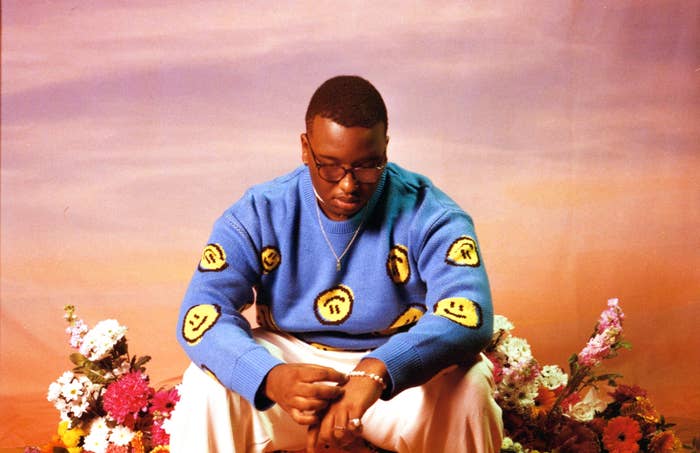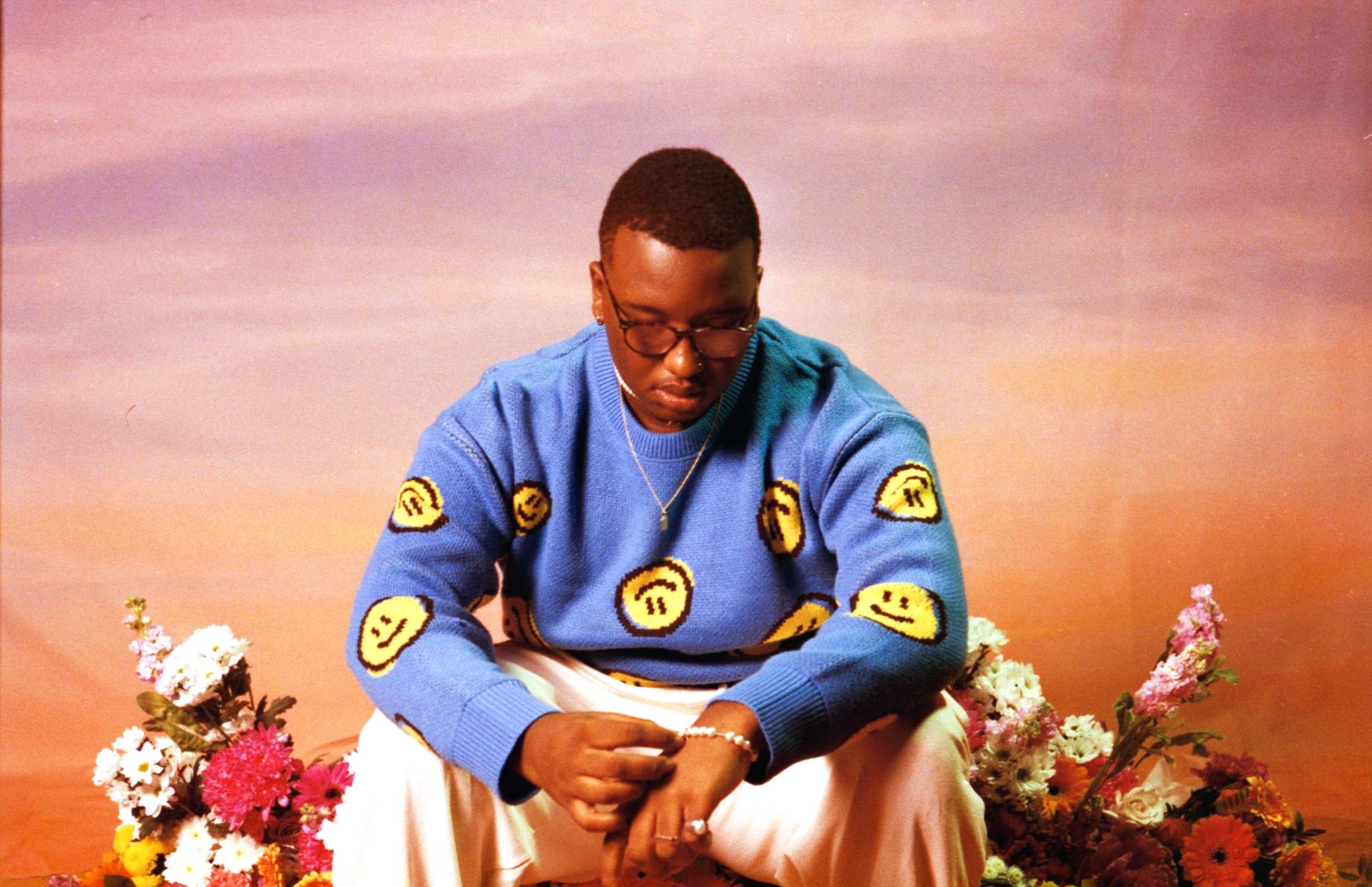
SIPHO. is here to challenge perceptions around Black male identity, artistry and creativity in 2022, with some of the best music that—we promise—you’ll have heard all year. Here we have a singer-songwriter with the vocal power to garner your attention from the very first note. Stop and drop everything—take time and listen. Lyrically, he’s quirky but smart with it, and while the voice may pack a hearty soul punch, the music defies genre and boxes, drawing on everything from rock and blues to gospel and R&B.
Born to Zimbabwean parents in Birmingham, alongside his two sisters, SIPHO.’s love for music came very early on. “I realised I could sing a bit when I was 6 years old,” he says. “By 8 years old, I was teaching myself guitar—bought for me by my dad—from watching YouTube videos. I also liked to fiddle about with instruments at school, in the music department. I got an idea of what a chord was and things snowballed from there.” 22-year-old SIPHO. is far beyond his years when it comes to his pen, articulating thoughts and wisdom of a seemingly much-seasoned soul. Signed to iconic West London label Dirty Hit, his first two projects have unsurprisingly garnered critical acclaim, his first UK tour unsurprisingly a sold-out affair. Early spots on Jools Holland, COLORS and Majestic Casual further certify his effortless live performances as essential viewing.
Now putting in the work on his debut album, and with his first festival season around the corner, Chantelle Fiddy took a moment out of fangirling and spoke to SIPHO. about defying convention, songwriting styles, his ideal dinner date and breaking the mould.
“Part of the reason why I do this is for people to take a moment and put themselves in another place. We spend so much time dashing about that I want to make a world with the music.”
COMPLEX: The first time I heard you was when your COLORS session popped up on my Instagram feed—your vocals really moved my soul. It touched me in a way that’s very rare in music these days so, firstly, I wanted to thank you for that. Do you find that your music has this affect on a lot of people?
Sipho: I don’t know. Obviously, part of the reason why I do this is for people to take a moment and put themselves in another place. We spend so much time dashing about that I want to make a world with the music. Let’s stop, let’s listen and think: what can we take from this?
Every song has something different. For example, when I first heard “Beady Eyes”, it made me think of Tame Impala. You defy genre. Are you a multi-instrumentalist?
Some things will resonate more, but I might have an element from a blues song with an element from rock, and they come together however they come together. I can play a bit of everything. To tell you the truth, I evolve with every song. I don’t think of genre, but intention. Like: what’s my point with the song, and what’s the feeling? I think people take in the feeling.
The way I feel about your songwriting was how I felt when I first heard a teenage MNEK, who was very honest in his approach. I think there are two types of songwriters out there: those who can only write from experience, and those who can write about anything and express emotions they might never have experienced.
I think I’ve put myself in a position where I’ve tried to hone my skill. Personal experience always wins for me; it’s a very real and intimate thing. I can do the other side of things, rise to the challenge, but it takes more time to encapsulate yourself within the song. Even being on stage, you have to sell emotion and you need to deliver the lyrics clearly. “Are you hearing me? Do you believe me?” You need to bring the drama with it. Sometimes you’ve got to look people in the eye. I’m not just here to play you a show. I’m not just here to make money. I’m here to share this experience with you! Once they recognise this, it’s amazing. To be able to sell the experience writing-wise and put it on stage or record, no matter what, is an important skill as a creator.
How have people been describing you so far? Are there common threads? And do you have any direct reference points or influences?
Any male vocalist with a big voice or who looks like me [laughs]. They love to throw out Sam Smith, Jacob Banks… In terms of my foundation, how I do and make my things, the long-term influences would be Frank Ocean, Solange, Earl Sweatshirt, Moses Sumney, James Blake. They’re imprinted on me. I’m into psych-rock at the moment, though, and Michael Kiwanuka.
Do you feel like you’re challenging Blackness, too? What I mean by that is the stereotype of the Black male artist. For example, if you look at Black women who do rock, due to consistent marginalisation, it takes someone like a Willow Smith for a ‘scene’ to garner attention.
I definitely feel like I’m challenging that in a lot of ways. It’s funny: I’ll find there are Black people who’ll listen to me and say, “I wouldn’t normally listen to that,” because they might feel I’m weird or different, but they recognise that it’s good music. And their general understanding of what a Black artist looks like, it’s quite linear. It’s also about challenging Blackness, not just to Black people but the general world as well. We also automatically get boxed into “Black genres” when it’s not even that. Like, “Beady Eyes” might have hints of certain sounds, but it’s not an R&B song—yet it’s getting placed in R&B spaces.
Because you’re a Black man with a soul voice?
Yeah. But there are pros and cons, I guess. I can stand here and look at it from a defensive mode, but I want to be in front of Black people at the same time. And I also know if “Beady Eyes” was a song made by someone who didn’t look like me, it probably wouldn’t have the same effect that it’s had. Pluses and minuses.
When did the music begin for you?
I realised I could sing a bit when I was 6 years old. By 8 years old, I was teaching myself guitar—bought for me by my dad—from watching YouTube videos. I also liked to fiddle about with instruments at school, in the music department. I got an idea of what a chord was and things snowballed from there. I ended up in an acapella group. We were really popular, thanks to our rendition of Pharrell’s “Happy”. But yeah…
—are you cringing?
It’s cool. We were really good, but it’s also a bit, like, I was that guy. I took the school concerts a bit more seriously than everyone else. I was very involved.
Was there a pivotal moment, musically speaking?
When I was 14, during the summer, one of my close friends, Frank, started putting me onto music. He had a laptop full of albums I’d never heard of. My thing is based on him. He was showing me James Blake, Flatbush Zombies, Rob Banks, people doing it themselves. Then, one day, I was watching [the Channel 4 music show]Four To The Floor, and that’s when I saw Etta Bond perform “Came To Be”. After that, I listened to her EP and then I learnt what an EP actually is. At that point, I’d begun experimenting and recording stuff. I realised I’d need to figure out some things but it could be cool if I could make this work.
Did you continue your studies?
I finished my GCSEs, went into A-Levels—the most traumatic experience, ever! We hate A-Levels—and I finished in 2018. I had to go uni and got a decent offer to study Sports Therapy, because the whole time I’d been heavily doing sports: track and field, as well as a bit of basketball. My parents noticed my stress and told me I didn’t have to go to uni straight away, and that I could take a year off and find out what I wanted to do. All coming from my African parents! After that, I got a job and used the money from that to finance my recording. I worked in a dental lab, making teeth. My teeth are real, though! [Laughs] But I remember, I got my first pay cheque: I woke up, saw the money in my account and went back to sleep. You don’t feel accomplished for making that money. It’s like, “Cool! Pay cheque! But the amount of effort I had to put in to get this.” I guess, from early on, that instilled in me the value of my labour and the blessing of the music industry, or creative industries—you can set your price and your value. So I think I was blessed in that. I did that job for a year then went to do my first year at BIMM. That’s where I met Chris Fraser from Dirty Hit. We were doing a showcase and I played Chris a couple of songs, asked him who he was, he explained himself and it went from there. Apparently, on the way back from the showcase, he texted his team saying, “We need to sign this guy.” And here we are now.
Your team is clearly on point—the campaigns have been slapping! An artist manager is like ‘your person’, so what’s your relationship like with yours?
Kieran was managing one of my friends and she put him onto me. At first, he didn’t get it, but eventually we got there. We set ourselves some goals, like Jools Holland, and we put it out there and got in with the work. It’s one of those things where I feel like you have to—and this is a phrase I’ve been using a lot—set a precedent. It’s about doing a lot of foundation work, understanding who you are and what you want. I feel like I’ve had time to figure that out and solidify my initial identity in my head.
It’s not always easy, financially speaking, being an artist—especially in the early days. With recovery of the live sector likely to take years, do you think there needs to be more awareness around the artist’s struggle, or is it just the way it is?
Honestly, I just think it’s the way it is. One thing that needs to be recognised is we’re running a business. We’re not just making music then making millions. The same way someone might have started their FTSE 500 company, sitting in the red for however many years, until whatever happens, happens, it’s the same thing for me and many artists. What makes that more palatable is having the right people around you, having people who understand the arc of that, and the right label. Dirty Hit, who I signed with, has The 1975—a band that’s experienced—and Rina Sawayama, who’s more up-and-coming but her tours are selling out like crazy, so you can see the progression. We’re blessed at the moment. We have a plan for the year ahead—go to the studio, do a bunch of shows—but we’re not overdoing anything. It’s about making the right choices to increase the value of your work. We know what we have and what we’re trying to do, but it takes time for people to recognise the work.
A lot has been written around your She Might Bleed EP being borne of a bad situation. I quote: “A thorough exploration of hypermasculinity.” But what actually happened?
It was January 2019, in Birmingham. I didn’t feel like I was in extreme danger, but I’m not a confrontational person and I had to work out how to deal with this situation. I have to manage this now. It brought a lot of questions to my mind. When I first walked past these boys, I tried to be a better person and not suspect anything. But these 14 or 15-year-old boys are looking at me, wanting to rob me, so it raised a lot of questions for ME. Why are you doing this? But they’re not going to answer this. So, okay, they’re out at this time, but when I was that age, I’d have to be home, so they have different situations going on. After that, I also decided to learn to fight. I got my friend to teach me a few things, just in case. I wasn’t thinking about it just with regard to me, because I have my mum, my sister, my girlfriend… I’m doing what I’m doing for that reason, and those guys are doing what they’re doing for their reason. And there’s a lot of showy, masculine behaviours we all do to peacock but it’s not genuinely us. A lot of that comes down to oppressing women or impacting women; it’s kind of proving yourself. It’s not healthy and we’re recognising that.
Most women inadvertently step outside the house everyday thinking: “Shit! Well, I can’t take my vagina off.” Check the Wanda Sykes sketch…
That reminds me of a Chapelle story when he was a teenager doing a show at a comedy club and some drug dealers gave him $25k in cash. Imagine being a 14-year-old kid going across NYC with $25k? If someone knew, the different things they’d do to you in the street to get that money. So now imagine you have a vagina…
There’s also the consideration as to how dangerous it is to be a Black artist having success. The amount of rappers getting woken up with a gun to their head is insane.
There’s a lot of haters out here! Luckily, I’m not in that space—I keep to myself. We’ll finish a show and we pack up and go home. I like to cool down my voice with some tea. Even my tour manager can’t believe how calm we are; young boys who like a spliff and go straight back home.
I love your quirks. Has the fashion side always been important to you?
Come on, bro! You’ve gotta have the drip on point! It’s also because, the way I want to build my world—if you look at the Tylers, the A$AP Rockys, they’ve done things to build a world. What you wear is part of your everyday life so it’s about curating and presenting a lifestyle. It’s not about selling—although I do have merch—it’s about the experience.
Imagine I said I was taking you out to dinner, what food would you like and who would you bring?
I think, because I’m young—I’m only 22—I want to experience as much as I can. I give myself excuses to try new things all the time. I haven’t tried real sushi yet; I’ve only had meal deal sushi [laughs]. So we can go for that and I’d bring my mum because she wants to see all the stuff. I’ve always wanted to have lunch with Dave Chapelle, and then who complements Dave? Alicia Keys can be the bridge—a good conversationalist, I reckon.
Lastly, can you surprise me?
I’m a Lord! Lord Sipho of Hougen Manor. My dad bought it for me for Christmas [laughs].
You can see Sipho live at The Great Escape, Dot To Dot Festival, El Dorado and more festivals this summer.




